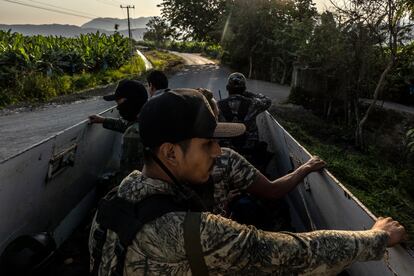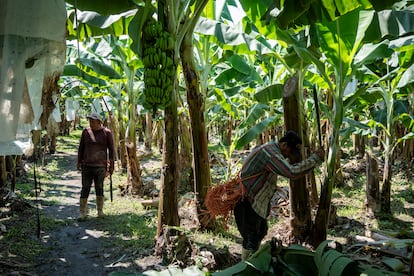Massacre of eight members of the Michoacán self-defense forces underlines the CJNG’s siege
Farming and mining towns between Michoacán and Colima are targets for the cartels. Their inhabitants try to protect themselves and have been asking for a stronger state security presence in the region for years


Commander Teto used to sell spare auto parts. In the town where he lives, Coahuayana, however, the norm is to work in the powerful mining industry or in the banana fields: 7,000 hectares of plantations where more than 350,000 tons of fruit are harvested each year and sold in the United States and Mexico. These are profitable businesses; so much so that the criminal groups in the area have always stalked them. That is why, 10 years ago, Commander Teto left behind his old life, when he was still called Hector Zepeda, and became the leader of an armed self-defense group, one of many in Michoacán, to repel the harassment of the cartels. Initially the struggle was against the Knights Templar. More recently, the enemy has been the Jalisco New Generation Cartel (CJNG).
Over the weekend, Coahuayana was in the news for the same reason it is usually in the news, beyond the fertile banana industry. “Eight people were killed on Saturday night when alleged community security forces clashed with a group of armed civilians on the border between Coahuayana and Colima,” began an article in La Jornada. In areas such as the banana corridor, a “group of armed civilians” usually means organized crime. This time, of course, it was the CJNG. Those killed belonged to the self-defense group led by Commander Teto.
The dead were named as Mario, Pedro, Ángel, Pedro, David, Francisco, Luis and Uriel. They were of Nahuatl origin. The local press says that their bodies were laid to rest in the town and a priest sang mass in their honor at the Nuestra Señora de la Asunción church. It also says that Commander Teto personally asked their families for forgiveness. They were ambushed by the CJNG while patrolling the forests surrounding Coahuayana, between towns with the prophetic names of La Presa (prisoner or prey) and Sal Si Puedes (leave if you can); the Efe news agency reported that the CJNG used a monster truck in the attack, a large armored vehicles made of layers of steel that look like homemade tanks. All eight were buried on Sunday.
The CJNG and other armed groups are besieging the region, dotted with beaches giving access to the Pacific Ocean, which according to the state Attorney General’s Office are ideal for trafficking drugs from South America. They maintain an encirclement based on bullets, anti-personnel mines, drones that can be purchased on the internet and are modified to launch homemade explosives, threats, kidnappings, and disappearances.
The inhabitants of Coahuayana and the nearby municipalities of Aquila and Ostula, between the borders of the states of Michoacán and Colima, have for years been asking for help, for a stronger state presence to deter the narcos, arrests, better security, anything. At the moment, they are losing the battle. For decades, self-defense groups like Teto’s have been sprouting up all over the region. When one is wiped out, another takes its place. It is the desperate solution of the people, to take up old hunting rifles or fifth-hand machine guns bought on the black market to try and fill the gaps left by the government.

In May, in an interview for this newspaper, Commander Teto confessed to being exhausted. “I am tired, but more disappointed with the government. The government continues to view us with distrust! We aren’t against them… we’re against them supporting others [the CJNG].” Near Coahuayana, there are Mexican army and National Guard bases, but the CJNG roam free with few consequences beyond the occasional skirmish. On occasion even the military are targeted, as in February, when at least three soldiers were killed in a drone ambush in Tepalcatepec, a few hours from Coahuayana in an area disputed between the CJNG and a local group called El Abuelo, who are allied with the Knights Templar.
The balance in and around Coahuayana is precarious, a fine line where those who always come off worst are the unarmed civilians, the peasants who grow bananas, those who work in mining, and those who sell auto parts. Teto acknowledged, in that interview, that the farmers are forced to pay a revolutionary tax to the cartel of one peso for each kilo of plantain (which they sell for six pesos), so that the trucks transporting the fruit can pass through the criminal-controlled land without any issues.
The authorities have promised to reinforce security and increase military patrols, the standard response after events like last Saturday’s, measures that for the moment remain insufficient for the local population. In addition to being a target for crime, in recent years displaced people have arrived in Coahuayana from the surrounding areas, from smaller or more isolated towns where the grip of the cartels is tighter, to seek refuge trusting that the self-defense forces will protect them. Commander Teto and his men try — the president of the local banana producers’ association stated that, since they have been patrolling the area, they have not faced any security problems on the plantations — but it is almost impossible to remain constantly alert.
Teto himself is an anomaly; it is unusual for men in his position to stay alive for so long, such as Hipólito Mora, another legendary leader of the Michoacán self-defense groups, who was shot dead last year. Or Juan José Farías, of whom little is known these days, in seclusion in Tepalcatepec and an enigma with uncertain loyalties. Or that of his eight men, gunned down in a town called Sal Si Puedes by a cartel’s homemade tank operating with impunity in plain sight.
Sign up for our weekly newsletter to get more English-language news coverage from EL PAÍS USA Edition
Tu suscripción se está usando en otro dispositivo
¿Quieres añadir otro usuario a tu suscripción?
Si continúas leyendo en este dispositivo, no se podrá leer en el otro.
FlechaTu suscripción se está usando en otro dispositivo y solo puedes acceder a EL PAÍS desde un dispositivo a la vez.
Si quieres compartir tu cuenta, cambia tu suscripción a la modalidad Premium, así podrás añadir otro usuario. Cada uno accederá con su propia cuenta de email, lo que os permitirá personalizar vuestra experiencia en EL PAÍS.
¿Tienes una suscripción de empresa? Accede aquí para contratar más cuentas.
En el caso de no saber quién está usando tu cuenta, te recomendamos cambiar tu contraseña aquí.
Si decides continuar compartiendo tu cuenta, este mensaje se mostrará en tu dispositivo y en el de la otra persona que está usando tu cuenta de forma indefinida, afectando a tu experiencia de lectura. Puedes consultar aquí los términos y condiciones de la suscripción digital.








































